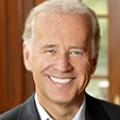-
Joseph R. Biden, Jr. is the Democratic candidate for President of the United States. Born in Scranton, Pennsylvania, Biden has a long career in public service, most notably serving as Vice President alongside President Barack Obama from 2009 to 2016. Prior to that , Biden served six consecutive terms in the U.S. Senate from 1973 to 2009. Biden is also the recipient of the Presidential Medal of Freedom with distinction, which only three others have received. In 1972, two weeks after his election to his first term in the Senate, his wife and daughter were killed in a car accident. In 2013, Biden also lost his eldest son to brain cancer.
Joe Biden speaks frequently about tragedy and loss as a way to communicate that he understands the hardships everyday Americans face, particularly when it comes to dealing with the healthcare system. One of his signature accomplishments was getting the Affordable Care Act passed, which helped expand health insurance for millions of Americans and guaranteed no one could be discriminated against for having a preexisting condition. Biden believes in building on the success of the Affordable Care Act - and has advocated for adding a public option, with the goal of universal coverage for all Americans, regardless of income.
Biden also came into office as Vice President during the depths of the Great Recession. He played a key role in planning the recovery effort, which pulled the American economy back from the brink and led to more than a decade of job growth. Biden’s decades of experience on the Senate Foreign Relations Committee also informed his more recent accomplishments on the world stage, including helping the U.S. join the Paris Climate Agreement, securing the Iran Nuclear Deal, and building international alliances.
Biden has received his fair share of criticism. He sponsored the 1994 crime bill, which is blamed for accelerating mass incarceration rates of Black and Brown Americans. Biden also supported the Hyde Amendment, a provision barring the use of federal funds for abortion. In both cases, Biden’s views evolved. In the past few years, he’s repudiated the crime bill and supported legislation to end the death penalty and reverse mass incarceration. Biden has also pledged to eliminate the Hyde amendment as part of his larger platform of expanding health care to all Americans.
Prior to the COVID-19 pandemic, Biden’s platform was already progressive. When it was clear he was going to win the primary, Biden pulled together top progressive leaders from across the political spectrum, from Bernie Sanders and Alexandria Ocasio-Cortez to John Kerry and Eric Holder. These committees were tasked with building a platform to address the greatest challenges of our time, including health care, criminal justice reform, and climate change.
Biden believes economic recovery cannot occur until the pandemic is under control, which he believes requires federal support for testing, distributing protective equipment, and providing federal aid to states and the unemployed. To kickstart the economy, Biden proposes mobilizing manufacturing, infrastructure spending, clean energy projects, funding and training for caregivers and educators, and fighting systemic racism through targeted investment.
At George Floyd’s funeral, Biden called on Congress to pass the House’s wide-ranging police reform bill, written in the wake of the ongoing, historic marches demanding racial justice all around the country. Joe Biden is also committed to passing the bill named in honor of John Lewis to enshrine the sacred right to vote. Finally, Biden supports the end of the Senate filibuster in order to pass progressive legislation and end decades of Republican obstruction to pass laws that enjoy broad support among Americans, including universal background checks for firearms.
Joe Biden has chosen Kamala Harris as his running mate and Vice Presidential candidate. Harris is the daughter of Indian and Jamaican immigrants. Her background is in law. She served as the San Francisco District Attorney from 2004 to 2011 and Attorney General of California from 2011 to 2016. She has represented the state of California in the U.S. Senate since 2017. Harris is well known for confronting Justice Brett Kavanaugh during his Supreme Court confirmation hearings over Dr. Christine Blasey-Ford’s serious allegations of sexual assault against him. Harris’s views are progressive; especially on health care. She has co-sponsored bills that would expand Medicare to cover all Americans.
Joe Biden is running against Republican incumbent Donald J. Trump. Trump has tried repeatedly to take away the rights of immigrants, the LGBTQ+ community, women, and tribes. He’s separated families at the border and put children in cages. He’s denied the reality of the climate crisis and repeatedly ignored the science that links it to the record setting fires, storms and floods devastating peoples’ lives. . Trump cheered GOP legislation like the 2017 tax bill, which burdened families and rewarded the rich and supported GOP efforts to roll back the Affordable Care Act and the protections it provides for Americans with pre-existing conditions.
Trump’s presidency has been characterized by unprecedented levels of corruption with a record number of staff, cabinet members and campaign staff indicted and convicted. His failure to lead during the COVID-19 pandemic, which has left hundreds of thousands of Americans dead and the economy in shambles. Trump even admitted on tape that he knew about the severity of the virus as early as February and deliberately withheld that information from the public. Trump is only the third president ever to be impeached by Congress. There are active criminal investigations against his businesses and his family. Openly, Trump seeks to undermine the bedrock principles of democracy by obstructing justice, attacking peaceful protesters, and using the powers of his office to prevent Americans from voting.
Joe Biden is the most progressive choice in the race for president.Joe Biden
Joseph R. Biden, Jr. is the Democratic candidate for President of the United States. Born in Scranton, Pennsylvania, Biden has a long career in public service, most notably serving as Vice President alongside President Barack Obama from 2009 to 2016.
Joseph R. Biden, Jr. is the Democratic candidate for President of the United States. Born in Scranton, Pennsylvania, Biden has a long career in public service, most notably serving as Vice President alongside President Barack Obama from 2009 to 2016. Prior to that , Biden served six consecutive terms in the U.S. Senate from 1973 to 2009. Biden is also the recipient of the Presidential Medal of Freedom with distinction, which only three others have received. In 1972, two weeks after his election to his first term in the Senate, his wife and daughter were killed in a car accident. In 2013, Biden also lost his eldest son to brain cancer.
Joe Biden speaks frequently about tragedy and loss as a way to communicate that he understands the hardships everyday Americans face, particularly when it comes to dealing with the healthcare system. One of his signature accomplishments was getting the Affordable Care Act passed, which helped expand health insurance for millions of Americans and guaranteed no one could be discriminated against for having a preexisting condition. Biden believes in building on the success of the Affordable Care Act - and has advocated for adding a public option, with the goal of universal coverage for all Americans, regardless of income.
Biden also came into office as Vice President during the depths of the Great Recession. He played a key role in planning the recovery effort, which pulled the American economy back from the brink and led to more than a decade of job growth. Biden’s decades of experience on the Senate Foreign Relations Committee also informed his more recent accomplishments on the world stage, including helping the U.S. join the Paris Climate Agreement, securing the Iran Nuclear Deal, and building international alliances.
Biden has received his fair share of criticism. He sponsored the 1994 crime bill, which is blamed for accelerating mass incarceration rates of Black and Brown Americans. Biden also supported the Hyde Amendment, a provision barring the use of federal funds for abortion. In both cases, Biden’s views evolved. In the past few years, he’s repudiated the crime bill and supported legislation to end the death penalty and reverse mass incarceration. Biden has also pledged to eliminate the Hyde amendment as part of his larger platform of expanding health care to all Americans.
Prior to the COVID-19 pandemic, Biden’s platform was already progressive. When it was clear he was going to win the primary, Biden pulled together top progressive leaders from across the political spectrum, from Bernie Sanders and Alexandria Ocasio-Cortez to John Kerry and Eric Holder. These committees were tasked with building a platform to address the greatest challenges of our time, including health care, criminal justice reform, and climate change.
Biden believes economic recovery cannot occur until the pandemic is under control, which he believes requires federal support for testing, distributing protective equipment, and providing federal aid to states and the unemployed. To kickstart the economy, Biden proposes mobilizing manufacturing, infrastructure spending, clean energy projects, funding and training for caregivers and educators, and fighting systemic racism through targeted investment.
At George Floyd’s funeral, Biden called on Congress to pass the House’s wide-ranging police reform bill, written in the wake of the ongoing, historic marches demanding racial justice all around the country. Joe Biden is also committed to passing the bill named in honor of John Lewis to enshrine the sacred right to vote. Finally, Biden supports the end of the Senate filibuster in order to pass progressive legislation and end decades of Republican obstruction to pass laws that enjoy broad support among Americans, including universal background checks for firearms.
Joe Biden has chosen Kamala Harris as his running mate and Vice Presidential candidate. Harris is the daughter of Indian and Jamaican immigrants. Her background is in law. She served as the San Francisco District Attorney from 2004 to 2011 and Attorney General of California from 2011 to 2016. She has represented the state of California in the U.S. Senate since 2017. Harris is well known for confronting Justice Brett Kavanaugh during his Supreme Court confirmation hearings over Dr. Christine Blasey-Ford’s serious allegations of sexual assault against him. Harris’s views are progressive; especially on health care. She has co-sponsored bills that would expand Medicare to cover all Americans.
Joe Biden is running against Republican incumbent Donald J. Trump. Trump has tried repeatedly to take away the rights of immigrants, the LGBTQ+ community, women, and tribes. He’s separated families at the border and put children in cages. He’s denied the reality of the climate crisis and repeatedly ignored the science that links it to the record setting fires, storms and floods devastating peoples’ lives. . Trump cheered GOP legislation like the 2017 tax bill, which burdened families and rewarded the rich and supported GOP efforts to roll back the Affordable Care Act and the protections it provides for Americans with pre-existing conditions.
Trump’s presidency has been characterized by unprecedented levels of corruption with a record number of staff, cabinet members and campaign staff indicted and convicted. His failure to lead during the COVID-19 pandemic, which has left hundreds of thousands of Americans dead and the economy in shambles. Trump even admitted on tape that he knew about the severity of the virus as early as February and deliberately withheld that information from the public. Trump is only the third president ever to be impeached by Congress. There are active criminal investigations against his businesses and his family. Openly, Trump seeks to undermine the bedrock principles of democracy by obstructing justice, attacking peaceful protesters, and using the powers of his office to prevent Americans from voting.
Joe Biden is the most progressive choice in the race for president.Joe Biden
Joseph R. Biden, Jr. is the Democratic candidate for President of the United States. Born in Scranton, Pennsylvania, Biden has a long career in public service, most notably serving as Vice President alongside President Barack Obama from 2009 to 2016.
68th House DIstrict
Not in 68th House DIstrict? Click here to choose your customized guide.
-
Kamala Harris is the Democratic candidate for Vice President of the United States. She was born in Oakland, California to immigrant parents. Her mother was a cancer researcher from India and her father is an economist from Jamaica. Senator Harris is the first Black woman and South Asian American of any gender to be nominated for Vice President of the United States by a major party.
Harris went to public schools, attended Howard University, and returned to San Francisco for law school. She began her law career in 1990 working in the Alameda County District Attorney's Office specializing in advocating for child victims of sexual assault. She then moved to the Deputy District Attorney’s office prosecuting criminal cases.
In 2003, she was the first woman to be elected District Attorney in San Francisco’s history. Harris fought against racial profiling as a driver of mass incarceration. She championed re-entry programs for youth offenders. As Attorney General, Harris also championed the Open Justice program, which provided public access to crime statistics, including use of force incidents by the police. She also expressed interest in redirecting police funds to social programs. Overall, prison incarceration rates in California dropped significantly during her six years as Attorney General.
In 2016, Kamala Harris was elected to the U.S. Senate. She captured national attention right away for her questioning of U.S. Attorney General candidate Jeff Sessions on issues related to foreign interference in the 2016 election. In 2018, Harris again captivated the nation in her questioning of Brett Kavanaugh, who was under scrutiny for sexual assault and political corruption. Her voting record in the Senate is progressive. She repeatedly co-sponsored bills to protect human rights. She also voted against the confirmation of the majority of the Trump Administration’s extreme rightwing candidates for office, including Betsy DeVos. Harris spoke out passionately against Republican efforts to block evidence from being considered in President Trump’s trial and ultimately voted to impeach him. She also vocally opposed the 2017 GOP Tax Bill, a massive tax giveaway to the richest one percent of Americans.
Kamala Harris’s opponent is Vice President Mike Pence. After finishing law school, Pence jumped into politics with two unsuccessful runs for Congress. His loss in 1990 is partially attributed to his embezzlement of campaign funds, which was not illegal at the time. He then built his career as a rightwing radio and television personality in Indiana. A decade later, he finally won an election for Congress and built a record as an enemy of reproductive rights, sensible firearm regulations, social programs for impoverished Americans, and protections for LGBTQ+ citizens. He was elected governor of Indiana in 2013. He refused federal funding for pre-Kindergarten programs, which earned him significant criticism. Pence then used his office to legalize discrimination against LGBTQ+ citizens. His bigotry and lack of leadership were so severe that Pence allowed one of the worst HIV outbreaks in the country to happen in Indiana under his watch.
In 2016, Presidential candidate Donald Trump chose Pence as his running mate. Trump chose Pence on the recommendation of Paul Manafort, who now serves jail time for lying to the FBI about his relationship between Russian military intelligence and the Trump campaign. Even though Pence serves as President of the Senate, he’s been completely absent in desperately needed negotiations over a second round of economic relief during the pandemic. He has supported Republicans in their near unanimous vote against full extended unemployment insurance, stimulus checks, support for health care systems, protective gear and testing for frontline workers, mail-in election funding, funding for state budget shortages to prevent layoffs, and new small business loans.
Kamala Harris is the most progressive choice in this race.Kamala Harris
Kamala Harris is the Democratic candidate for Vice President of the United States. She was born in Oakland, California to immigrant parents. Her mother was a cancer researcher from India and her father is an economist from Jamaica.
Kamala Harris is the Democratic candidate for Vice President of the United States. She was born in Oakland, California to immigrant parents. Her mother was a cancer researcher from India and her father is an economist from Jamaica. Senator Harris is the first Black woman and South Asian American of any gender to be nominated for Vice President of the United States by a major party.
Harris went to public schools, attended Howard University, and returned to San Francisco for law school. She began her law career in 1990 working in the Alameda County District Attorney's Office specializing in advocating for child victims of sexual assault. She then moved to the Deputy District Attorney’s office prosecuting criminal cases.
In 2003, she was the first woman to be elected District Attorney in San Francisco’s history. Harris fought against racial profiling as a driver of mass incarceration. She championed re-entry programs for youth offenders. As Attorney General, Harris also championed the Open Justice program, which provided public access to crime statistics, including use of force incidents by the police. She also expressed interest in redirecting police funds to social programs. Overall, prison incarceration rates in California dropped significantly during her six years as Attorney General.
In 2016, Kamala Harris was elected to the U.S. Senate. She captured national attention right away for her questioning of U.S. Attorney General candidate Jeff Sessions on issues related to foreign interference in the 2016 election. In 2018, Harris again captivated the nation in her questioning of Brett Kavanaugh, who was under scrutiny for sexual assault and political corruption. Her voting record in the Senate is progressive. She repeatedly co-sponsored bills to protect human rights. She also voted against the confirmation of the majority of the Trump Administration’s extreme rightwing candidates for office, including Betsy DeVos. Harris spoke out passionately against Republican efforts to block evidence from being considered in President Trump’s trial and ultimately voted to impeach him. She also vocally opposed the 2017 GOP Tax Bill, a massive tax giveaway to the richest one percent of Americans.
Kamala Harris’s opponent is Vice President Mike Pence. After finishing law school, Pence jumped into politics with two unsuccessful runs for Congress. His loss in 1990 is partially attributed to his embezzlement of campaign funds, which was not illegal at the time. He then built his career as a rightwing radio and television personality in Indiana. A decade later, he finally won an election for Congress and built a record as an enemy of reproductive rights, sensible firearm regulations, social programs for impoverished Americans, and protections for LGBTQ+ citizens. He was elected governor of Indiana in 2013. He refused federal funding for pre-Kindergarten programs, which earned him significant criticism. Pence then used his office to legalize discrimination against LGBTQ+ citizens. His bigotry and lack of leadership were so severe that Pence allowed one of the worst HIV outbreaks in the country to happen in Indiana under his watch.
In 2016, Presidential candidate Donald Trump chose Pence as his running mate. Trump chose Pence on the recommendation of Paul Manafort, who now serves jail time for lying to the FBI about his relationship between Russian military intelligence and the Trump campaign. Even though Pence serves as President of the Senate, he’s been completely absent in desperately needed negotiations over a second round of economic relief during the pandemic. He has supported Republicans in their near unanimous vote against full extended unemployment insurance, stimulus checks, support for health care systems, protective gear and testing for frontline workers, mail-in election funding, funding for state budget shortages to prevent layoffs, and new small business loans.
Kamala Harris is the most progressive choice in this race.Kamala Harris
Kamala Harris is the Democratic candidate for Vice President of the United States. She was born in Oakland, California to immigrant parents. Her mother was a cancer researcher from India and her father is an economist from Jamaica.
-
Senator Gary Peters was first elected to the United States Senate in 2015 and was the only non-incumbent Democrat to win a Senate election in 2014. Before he was elected to the U.S. Senate, he was a financial advisor and part of the Navy Reserves. He also served in the Michigan State Senate from 1995-2002, the Michigan Lottery Commission from 2003-2007, and the U.S. House of Representatives from 2009-2015.
While Peters has been in office, the biggest issues he’s fought for include veterans’ health and safety, lowering prescription drug costs, protecting the Great Lakes, fighting for small businesses, keeping the government transparent with the people, and fighting against the 1% by supporting movements like Occupy Wall Street. He’s also well known for working across the aisle effectively.
Peters has also been a champion for reproductive health throughout his political career. He fought for the Affordable Care Act, expanding healthcare including no co-pays for contraceptives, and has defended it ever since. He also opposed the 2013 “Rape Insurance” bill that passed in Michigan, and is a strong ally for reproductive rights.
Most recently he filed an investigation into efforts to cripple the United States Postal Service and expressed concerns about delayed absentee ballots and other important packages like medications, bill payments, and Social Security checks.
Peters, a veteran and an expert in national security, serves as the Ranking Member of the Homeland Security and Governmental Affairs Committee, as well as the Senate Armed Services Committee.
Gary Peters is a man of dignity who takes human rights very seriously. In his time in office as a Congressman and a Senator he’s voted for the Recovery Act, the Affordable Care Act (“Obamacare”), the Lilly Ledbetter Fair Pay Act, and the DREAM Act, all of which have passed and have made life in the United States better for everyone.
Sen. Peters has been endorsed by six of our partner organizations fighting for a Michigan where everyone thrives. This includes Michigan Education Association, American Federation of Teachers, American Federation of Labor and Congress of Industrial Organizations, Clean Water Action, Planned Parenthood Advocates of Michigan, Between the Lines, and BlackPAC.
Sen. Peters is facing a challenge from John James, who in a previous campaign had a swastika in his political ad and said he supported the “Trump agenda 2000 percent.”
We highly recommend re-electing Sen. Gary Peters, who is the most progressive choice in this race.
Learn more here: https://petersformichigan.com/Gary Peters
Senator Gary Peters was first elected to the United States Senate in 2015 and was the only non-incumbent Democrat to win a Senate election in 2014. Before he was elected to the U.S. Senate, he was a financial advisor and part of the Navy Reserves.
Senator Gary Peters was first elected to the United States Senate in 2015 and was the only non-incumbent Democrat to win a Senate election in 2014. Before he was elected to the U.S. Senate, he was a financial advisor and part of the Navy Reserves. He also served in the Michigan State Senate from 1995-2002, the Michigan Lottery Commission from 2003-2007, and the U.S. House of Representatives from 2009-2015.
While Peters has been in office, the biggest issues he’s fought for include veterans’ health and safety, lowering prescription drug costs, protecting the Great Lakes, fighting for small businesses, keeping the government transparent with the people, and fighting against the 1% by supporting movements like Occupy Wall Street. He’s also well known for working across the aisle effectively.
Peters has also been a champion for reproductive health throughout his political career. He fought for the Affordable Care Act, expanding healthcare including no co-pays for contraceptives, and has defended it ever since. He also opposed the 2013 “Rape Insurance” bill that passed in Michigan, and is a strong ally for reproductive rights.
Most recently he filed an investigation into efforts to cripple the United States Postal Service and expressed concerns about delayed absentee ballots and other important packages like medications, bill payments, and Social Security checks.
Peters, a veteran and an expert in national security, serves as the Ranking Member of the Homeland Security and Governmental Affairs Committee, as well as the Senate Armed Services Committee.
Gary Peters is a man of dignity who takes human rights very seriously. In his time in office as a Congressman and a Senator he’s voted for the Recovery Act, the Affordable Care Act (“Obamacare”), the Lilly Ledbetter Fair Pay Act, and the DREAM Act, all of which have passed and have made life in the United States better for everyone.
Sen. Peters has been endorsed by six of our partner organizations fighting for a Michigan where everyone thrives. This includes Michigan Education Association, American Federation of Teachers, American Federation of Labor and Congress of Industrial Organizations, Clean Water Action, Planned Parenthood Advocates of Michigan, Between the Lines, and BlackPAC.
Sen. Peters is facing a challenge from John James, who in a previous campaign had a swastika in his political ad and said he supported the “Trump agenda 2000 percent.”
We highly recommend re-electing Sen. Gary Peters, who is the most progressive choice in this race.
Learn more here: https://petersformichigan.com/Gary Peters
Senator Gary Peters was first elected to the United States Senate in 2015 and was the only non-incumbent Democrat to win a Senate election in 2014. Before he was elected to the U.S. Senate, he was a financial advisor and part of the Navy Reserves.
Chief Justice Bridget Mary McCormack and Elizabeth Welch are our recommendations for the Michigan Supreme Court. Both candidates will protect our civil rights while ensuring justice for all.
The Michigan Supreme Court race appears on the non-partisan section of the ballot, but McCormack and Welch were nominated by the Michigan Democratic Party. Be sure to turn your ballot over and do not leave this important race blank.
-
After being elected to the Michigan Supreme Court in 2012, Bridget Mary McCormack was chosen by both her Democratic and GOP colleagues to serve as Chief Justice. She has kept the court transparent throughout the COVID-19 pandemic by moving hearings online and has shown a high level of professionalism and leadership from the bench that is needed on the state’s highest court.
Bridget Mary McCormack
After being elected to the Michigan Supreme Court in 2012, Bridget Mary McCormack was chosen by both her Democratic and GOP colleagues to serve as Chief Justice.
After being elected to the Michigan Supreme Court in 2012, Bridget Mary McCormack was chosen by both her Democratic and GOP colleagues to serve as Chief Justice. She has kept the court transparent throughout the COVID-19 pandemic by moving hearings online and has shown a high level of professionalism and leadership from the bench that is needed on the state’s highest court.
Bridget Mary McCormack
After being elected to the Michigan Supreme Court in 2012, Bridget Mary McCormack was chosen by both her Democratic and GOP colleagues to serve as Chief Justice.
-
Elizabeth Welch has stood up for communities throughout her legal career and personal life. She was active in her school community and served as a board member of the Michigan League of Conservation Voters. She helped push back against big pharma and get funding for communities hit hard by the opioid crisis and has a strong record of supporting workplace safety standards. Welch is endorsed by AFT Michigan, Planned Parenthood Advocates of Michigan, and a host of other labor and progressive organizations.
Elizabeth Welch
Elizabeth Welch has stood up for communities throughout her legal career and personal life. She was active in her school community and served as a board member of the Michigan League of Conservation Voters.
Elizabeth Welch has stood up for communities throughout her legal career and personal life. She was active in her school community and served as a board member of the Michigan League of Conservation Voters. She helped push back against big pharma and get funding for communities hit hard by the opioid crisis and has a strong record of supporting workplace safety standards. Welch is endorsed by AFT Michigan, Planned Parenthood Advocates of Michigan, and a host of other labor and progressive organizations.
Elizabeth Welch
Elizabeth Welch has stood up for communities throughout her legal career and personal life. She was active in her school community and served as a board member of the Michigan League of Conservation Voters.
Other Candidates
Also in this race are Brock Swartzle and Mary Kelly, the Republican-nominated candidates running for the court against McCormack and Welch. We strongly recommend not voting for either of these candidates.
Mary Kelly has faced questions of nepotism involving her job in the same court where her husband is chief judge and fired a longtime public employee in what was clearly a case of political retribution because he refused to back her candidacy for judge.
Swartzle has a long history of being a GOP operative, a lawyer who defended foreclosure companies, and was appointed to the Court of Appeals by former Gov. Rick Snyder under very shady circumstances that was called an act of “political patronage,” according to the Detroit Free Press.
MI Supreme Court - other
Also in this race are Brock Swartzle and Mary Kelly, the Republican-nominated candidates running for the court against McCormack and Welch. We strongly recommend not voting for either of these candidates.
-
Sarah Anthony is an incumbent running for her second term in the Michigan House for Representatives in the 68th District. Before Anthony was a representative, she was elected to the Ingham County Board of Commissioners serving as the Chair of the Democratic Caucus, the Finance Committee, and Vice Chair of the Board. Currently she serves as the Democratic Caucus Chair in the House, and served as member of the Michigan Legislative Labor Caucus, Michigan Legislative Black Caucus, Progressive Women's Caucus, and the Criminal Justice Reform Caucus.
Anthony’s priorities include committing to fixing our crumbling infrastructure, investing in early childhood education and funding our public schools, and ensuring Michiganders have accessible and affordable healthcare. Anthony also believes in growing our middle class and increasing the minimum wage, cleaning up our environment, promoting common sense gun reform, and protecting workers’ rights and standing firmly behind unions.
Anthony is endorsed by six of our partner organizations American Federation of Teachers, Michigan AFL-CIO, Michigan League of Conservation Voters, Sierra Club, Planned Parenthood Advocates of Michigan, and Between the Lines.
Anthony is running against Robert Atkinson. While we didn't see endorsements for Atkinson from organizations that concern us, they also don't have the support of any of our partner organizations and therefore we cannot recommend them.
Anthony is the most progressive choice in this race.
Learn more: https://www.votesarahanthony.com/Sarah Anthony
Sarah Anthony is an incumbent running for her second term in the Michigan House for Representatives in the 68th District.Sarah Anthony is an incumbent running for her second term in the Michigan House for Representatives in the 68th District. Before Anthony was a representative, she was elected to the Ingham County Board of Commissioners serving as the Chair of the Democratic Caucus, the Finance Committee, and Vice Chair of the Board. Currently she serves as the Democratic Caucus Chair in the House, and served as member of the Michigan Legislative Labor Caucus, Michigan Legislative Black Caucus, Progressive Women's Caucus, and the Criminal Justice Reform Caucus.
Anthony’s priorities include committing to fixing our crumbling infrastructure, investing in early childhood education and funding our public schools, and ensuring Michiganders have accessible and affordable healthcare. Anthony also believes in growing our middle class and increasing the minimum wage, cleaning up our environment, promoting common sense gun reform, and protecting workers’ rights and standing firmly behind unions.
Anthony is endorsed by six of our partner organizations American Federation of Teachers, Michigan AFL-CIO, Michigan League of Conservation Voters, Sierra Club, Planned Parenthood Advocates of Michigan, and Between the Lines.
Anthony is running against Robert Atkinson. While we didn't see endorsements for Atkinson from organizations that concern us, they also don't have the support of any of our partner organizations and therefore we cannot recommend them.
Anthony is the most progressive choice in this race.
Learn more: https://www.votesarahanthony.com/Sarah Anthony
Sarah Anthony is an incumbent running for her second term in the Michigan House for Representatives in the 68th District.
-
The State Board of Education oversees education policy in the state of Michigan. There are two seats on the board up for grabs and we recommend Democrats Ellen Cogen Lipton and Jason Strayhorn in this race.
A fierce advocate for public education and government transparency, Ellen Cogen Lipton served six years in the Michigan House of Representatives, including a term as Democratic Vice Chair of the House Education Committee.
A proud parent of three public school children and raised in a family of educators, Jason Strayhorn believes that our best investment as a state is in providing every child a high-quality and equitable education.
Both Cogen Lipton and Jason Strayhorn are endorsed by Between the Lines, Michigan AFL-CIO, AFT Michigan and UAW.
The Republicans in the race are Toni Carlone and Michelle Frederick. We do not recommend either candidate because they have been endorsed by Right to Life of Michigan.
Cogen Lipton and Strayhorn are the progressive choices in this race.
Ellen Cogen Lipton
The State Board of Education oversees education policy in the state of Michigan. There are two seats on the board up for grabs and we recommend Democrats Ellen Cogen Lipton and Jason Strayhorn in this race.
The State Board of Education oversees education policy in the state of Michigan. There are two seats on the board up for grabs and we recommend Democrats Ellen Cogen Lipton and Jason Strayhorn in this race.
A fierce advocate for public education and government transparency, Ellen Cogen Lipton served six years in the Michigan House of Representatives, including a term as Democratic Vice Chair of the House Education Committee.
A proud parent of three public school children and raised in a family of educators, Jason Strayhorn believes that our best investment as a state is in providing every child a high-quality and equitable education.
Both Cogen Lipton and Jason Strayhorn are endorsed by Between the Lines, Michigan AFL-CIO, AFT Michigan and UAW.
The Republicans in the race are Toni Carlone and Michelle Frederick. We do not recommend either candidate because they have been endorsed by Right to Life of Michigan.
Cogen Lipton and Strayhorn are the progressive choices in this race.
Ellen Cogen Lipton
The State Board of Education oversees education policy in the state of Michigan. There are two seats on the board up for grabs and we recommend Democrats Ellen Cogen Lipton and Jason Strayhorn in this race.
-
The State Board of Education oversees education policy in the state of Michigan. There are two seats on the board up for grabs and we recommend Democrats Ellen Cogen Lipton and Jason Strayhorn in this race.
A fierce advocate for public education and government transparency, Ellen Cogen Lipton served six years in the Michigan House of Representatives, including a term as Democratic Vice Chair of the House Education Committee.
A proud parent of three public school children and raised in a family of educators, Jason Strayhorn believes that our best investment as a state is in providing every child a high-quality and equitable education.
Both Cogen Lipton and Jason Strayhorn are endorsed by Between the Lines, Michigan AFL-CIO, AFT Michigan and UAW.
The Republicans in the race are Toni Carlone and Michelle Frederick. We do not recommend either candidate because they have been endorsed by Right to Life of Michigan.
Cogen Lipton and Strayhorn are the progressive choices in this race.
Jason Strayhorn
The State Board of Education oversees education policy in the state of Michigan. There are two seats on the board up for grabs and we recommend Democrats Ellen Cogen Lipton and Jason Strayhorn in this race.
The State Board of Education oversees education policy in the state of Michigan. There are two seats on the board up for grabs and we recommend Democrats Ellen Cogen Lipton and Jason Strayhorn in this race.
A fierce advocate for public education and government transparency, Ellen Cogen Lipton served six years in the Michigan House of Representatives, including a term as Democratic Vice Chair of the House Education Committee.
A proud parent of three public school children and raised in a family of educators, Jason Strayhorn believes that our best investment as a state is in providing every child a high-quality and equitable education.
Both Cogen Lipton and Jason Strayhorn are endorsed by Between the Lines, Michigan AFL-CIO, AFT Michigan and UAW.
The Republicans in the race are Toni Carlone and Michelle Frederick. We do not recommend either candidate because they have been endorsed by Right to Life of Michigan.
Cogen Lipton and Strayhorn are the progressive choices in this race.
Jason Strayhorn
The State Board of Education oversees education policy in the state of Michigan. There are two seats on the board up for grabs and we recommend Democrats Ellen Cogen Lipton and Jason Strayhorn in this race.
-
The University of Michigan Board of Regents is the governing body of the University of Michigan and there are two seats on the board up for election this year. We recommend incumbent Democrats Mark Bernstein and Shauna Ryder-Diggs as the progressive choices in this race.
Holding a BA, JD, and MBA from the University of Michigan, Mark Bernstein was first elected to the Board of Regents in 2012 and has fought for affordable higher education, and has advocated for graduate and lecturer faculty at the University of Michigan.
As the first doctor elected to the University of Michigan Board of Regents in 2012, Shauna Ryder-Diggs earned her BS and MD from the University of Michigan and is an advocate for affordable tuition and financial responsibility, faculty advancement and support, and creating a strategic plan for diversity and inclusion. A former union member herself, Ryder-Diggs has been a strong advocate for UM employees and their unions.
The Republicans in this race are Sarah Hubbard and Carl Meyers, both of whom are endorsed by the anti-choice Right to Life of Michigan. We do not recommend either of these candidates.
The progressive choices in this race are Mark Bernstein and Shauna Ryder-Diggs.
Mark Bernstein
The University of Michigan Board of Regents is the governing body of the University of Michigan and there are two seats on the board up for election this year.
The University of Michigan Board of Regents is the governing body of the University of Michigan and there are two seats on the board up for election this year. We recommend incumbent Democrats Mark Bernstein and Shauna Ryder-Diggs as the progressive choices in this race.
Holding a BA, JD, and MBA from the University of Michigan, Mark Bernstein was first elected to the Board of Regents in 2012 and has fought for affordable higher education, and has advocated for graduate and lecturer faculty at the University of Michigan.
As the first doctor elected to the University of Michigan Board of Regents in 2012, Shauna Ryder-Diggs earned her BS and MD from the University of Michigan and is an advocate for affordable tuition and financial responsibility, faculty advancement and support, and creating a strategic plan for diversity and inclusion. A former union member herself, Ryder-Diggs has been a strong advocate for UM employees and their unions.
The Republicans in this race are Sarah Hubbard and Carl Meyers, both of whom are endorsed by the anti-choice Right to Life of Michigan. We do not recommend either of these candidates.
The progressive choices in this race are Mark Bernstein and Shauna Ryder-Diggs.
Mark Bernstein
The University of Michigan Board of Regents is the governing body of the University of Michigan and there are two seats on the board up for election this year.
-
The University of Michigan Board of Regents is the governing body of the University of Michigan and there are two seats on the board up for election this year. We recommend incumbent Democrats Mark Bernstein and Shauna Ryder-Diggs as the progressive choices in this race.
Holding a BA, JD, and MBA from the University of Michigan, Mark Bernstein was first elected to the Board of Regents in 2012 and has fought for affordable higher education, and has advocated for graduate and lecturer faculty at the University of Michigan.
As the first doctor elected to the University of Michigan Board of Regents in 2012, Shauna Ryder-Diggs earned her BS and MD from the University of Michigan and is an advocate for affordable tuition and financial responsibility, faculty advancement and support, and creating a strategic plan for diversity and inclusion. A former union member herself, Ryder-Diggs has been a strong advocate for UM employees and their unions.
The Republicans in this race are Sarah Hubbard and Carl Meyers, both of whom are endorsed by the anti-choice Right to Life of Michigan. We do not recommend either of these candidates.
The progressive choices in this race are Mark Bernstein and Shauna Ryder-Diggs.
Shauna Ryder-Diggs
The University of Michigan Board of Regents is the governing body of the University of Michigan and there are two seats on the board up for election this year.
The University of Michigan Board of Regents is the governing body of the University of Michigan and there are two seats on the board up for election this year. We recommend incumbent Democrats Mark Bernstein and Shauna Ryder-Diggs as the progressive choices in this race.
Holding a BA, JD, and MBA from the University of Michigan, Mark Bernstein was first elected to the Board of Regents in 2012 and has fought for affordable higher education, and has advocated for graduate and lecturer faculty at the University of Michigan.
As the first doctor elected to the University of Michigan Board of Regents in 2012, Shauna Ryder-Diggs earned her BS and MD from the University of Michigan and is an advocate for affordable tuition and financial responsibility, faculty advancement and support, and creating a strategic plan for diversity and inclusion. A former union member herself, Ryder-Diggs has been a strong advocate for UM employees and their unions.
The Republicans in this race are Sarah Hubbard and Carl Meyers, both of whom are endorsed by the anti-choice Right to Life of Michigan. We do not recommend either of these candidates.
The progressive choices in this race are Mark Bernstein and Shauna Ryder-Diggs.
Shauna Ryder-Diggs
The University of Michigan Board of Regents is the governing body of the University of Michigan and there are two seats on the board up for election this year.
-
The Michigan State Board of Trustees is the governing body of Michigan State University and there are two seats on the board up for election this year. We recommend incumbent Brian Mosallam and Rema Reynolds-Vassar as the progressive choices in this race.
First elected to the board in 2012, Brian Mosallam has stood up for employees and students of MSU, and fought for justice and dignity for the survivors of sexual assault.
As a former K-12 public school teacher, counselor, administrator, and parent organizer with over two decades of experience, Dr. Rema Reynolds-Vassar is a university educator with a dedication to equity, access, inclusion, and safety for every student, faculty, staff, and alum.
The Republicans in the race are Pat O’Keefe and Tonya Schuitmaker. We do not recommend either candidate. O’Keefe’s has received the support of right-wing U.S. Senate candidate John James. Schuitmaker is a former legislator who racked up a very conservative voting record in Lansing and is endorsed by Right to Life of Michigan.
Mosallam and Dr. Reynolds-Vassar are the progressive choices in this race.
Brian Mosallam
The Michigan State Board of Trustees is the governing body of Michigan State University and there are two seats on the board up for election this year.
The Michigan State Board of Trustees is the governing body of Michigan State University and there are two seats on the board up for election this year. We recommend incumbent Brian Mosallam and Rema Reynolds-Vassar as the progressive choices in this race.
First elected to the board in 2012, Brian Mosallam has stood up for employees and students of MSU, and fought for justice and dignity for the survivors of sexual assault.
As a former K-12 public school teacher, counselor, administrator, and parent organizer with over two decades of experience, Dr. Rema Reynolds-Vassar is a university educator with a dedication to equity, access, inclusion, and safety for every student, faculty, staff, and alum.
The Republicans in the race are Pat O’Keefe and Tonya Schuitmaker. We do not recommend either candidate. O’Keefe’s has received the support of right-wing U.S. Senate candidate John James. Schuitmaker is a former legislator who racked up a very conservative voting record in Lansing and is endorsed by Right to Life of Michigan.
Mosallam and Dr. Reynolds-Vassar are the progressive choices in this race.
Brian Mosallam
The Michigan State Board of Trustees is the governing body of Michigan State University and there are two seats on the board up for election this year.
-
The Michigan State Board of Trustees is the governing body of Michigan State University and there are two seats on the board up for election this year. We recommend incumbent Brian Mosallam and Rema Reynolds-Vassar as the progressive choices in this race.
First elected to the board in 2012, Brian Mosallam has stood up for employees and students of MSU, and fought for justice and dignity for the survivors of sexual assault.
As a former K-12 public school teacher, counselor, administrator, and parent organizer with over two decades of experience, Dr. Rema Reynolds-Vassar is a university educator with a dedication to equity, access, inclusion, and safety for every student, faculty, staff, and alum.
The Republicans in the race are Pat O’Keefe and Tonya Schuitmaker. We do not recommend either candidate. O’Keefe’s has received the support of right-wing U.S. Senate candidate John James. Schuitmaker is a former legislator who racked up a very conservative voting record in Lansing and is endorsed by Right to Life of Michigan.
Mosallam and Dr. Reynolds-Vassar are the progressive choices in this race.
Dr. Rema Reynolds-Vassar
The Michigan State Board of Trustees is the governing body of Michigan State University and there are two seats on the board up for election this year.
The Michigan State Board of Trustees is the governing body of Michigan State University and there are two seats on the board up for election this year. We recommend incumbent Brian Mosallam and Rema Reynolds-Vassar as the progressive choices in this race.
First elected to the board in 2012, Brian Mosallam has stood up for employees and students of MSU, and fought for justice and dignity for the survivors of sexual assault.
As a former K-12 public school teacher, counselor, administrator, and parent organizer with over two decades of experience, Dr. Rema Reynolds-Vassar is a university educator with a dedication to equity, access, inclusion, and safety for every student, faculty, staff, and alum.
The Republicans in the race are Pat O’Keefe and Tonya Schuitmaker. We do not recommend either candidate. O’Keefe’s has received the support of right-wing U.S. Senate candidate John James. Schuitmaker is a former legislator who racked up a very conservative voting record in Lansing and is endorsed by Right to Life of Michigan.
Mosallam and Dr. Reynolds-Vassar are the progressive choices in this race.
Dr. Rema Reynolds-Vassar
The Michigan State Board of Trustees is the governing body of Michigan State University and there are two seats on the board up for election this year.
-
The Wayne State Board of Governors is the governing body of Wayne State University and there are two seats on the board up for election this year. We recommend Democrats Eva Garza-Dewaelsche and Shirley Stancato as the progressive choices in this race.
With BA and Masters of Education degrees from Wayne State University, Eva Garza-Dewaelsche is running for WSU Governor to promote greater opportunities for students of color and non-traditional students, increase enrollment and graduation rates, and strengthen the voices of educators and workers in university decision making.
Appointed to fill a vacancy on the Wayne State Board of Governors in 2019, Shirley Stancato is a social justice advocate and prominent Detroit civic and community leader. Stancato is an architect of civic engagement opportunities that bridge economic, geographical and racial divides and spent her career at the helm of New Detroit, uniting community organizations in the mission of identifying and eliminating racial disparities in metro Detroit.
The Republicans in the race are Terri Lynn Land and Don Gates. We do not recommend either of these candidates. Terri Lynn Land is a failed U.S. Senate candidate and former Michigan Secretary of State who was tapped by the GOP late in the game after their incumbent candidate was barred from the race because of campaign finance issues. Gates is endorsed by the anti-choice Right to Life of Michigan.
Garza-Dewaelsche and Stancato are the progressive choices in this race.
Eva Garza-Dewaelsche
The Wayne State Board of Governors is the governing body of Wayne State University and there are two seats on the board up for election this year.
The Wayne State Board of Governors is the governing body of Wayne State University and there are two seats on the board up for election this year. We recommend Democrats Eva Garza-Dewaelsche and Shirley Stancato as the progressive choices in this race.
With BA and Masters of Education degrees from Wayne State University, Eva Garza-Dewaelsche is running for WSU Governor to promote greater opportunities for students of color and non-traditional students, increase enrollment and graduation rates, and strengthen the voices of educators and workers in university decision making.
Appointed to fill a vacancy on the Wayne State Board of Governors in 2019, Shirley Stancato is a social justice advocate and prominent Detroit civic and community leader. Stancato is an architect of civic engagement opportunities that bridge economic, geographical and racial divides and spent her career at the helm of New Detroit, uniting community organizations in the mission of identifying and eliminating racial disparities in metro Detroit.
The Republicans in the race are Terri Lynn Land and Don Gates. We do not recommend either of these candidates. Terri Lynn Land is a failed U.S. Senate candidate and former Michigan Secretary of State who was tapped by the GOP late in the game after their incumbent candidate was barred from the race because of campaign finance issues. Gates is endorsed by the anti-choice Right to Life of Michigan.
Garza-Dewaelsche and Stancato are the progressive choices in this race.
Eva Garza-Dewaelsche
The Wayne State Board of Governors is the governing body of Wayne State University and there are two seats on the board up for election this year.
-
The Wayne State Board of Governors is the governing body of Wayne State University and there are two seats on the board up for election this year. We recommend Democrats Eva Garza-Dewaelsche and Shirley Stancato as the progressive choices in this race.
With BA and Masters of Education degrees from Wayne State University, Eva Garza-Dewaelsche is running for WSU Governor to promote greater opportunities for students of color and non-traditional students, increase enrollment and graduation rates, and strengthen the voices of educators and workers in university decision making.
Appointed to fill a vacancy on the Wayne State Board of Governors in 2019, Shirley Stancato is a social justice advocate and prominent Detroit civic and community leader. Stancato is an architect of civic engagement opportunities that bridge economic, geographical and racial divides and spent her career at the helm of New Detroit, uniting community organizations in the mission of identifying and eliminating racial disparities in metro Detroit.
The Republicans in the race are Terri Lynn Land and Don Gates. We do not recommend either of these candidates. Terri Lynn Land is a failed U.S. Senate candidate and former Michigan Secretary of State who was tapped by the GOP late in the game after their incumbent candidate was barred from the race because of campaign finance issues. Gates is endorsed by the anti-choice Right to Life of Michigan.
Garza-Dewaelsche and Stancato are the progressive choices in this race.
Shirley Stancato
The Wayne State Board of Governors is the governing body of Wayne State University and there are two seats on the board up for election this year.
The Wayne State Board of Governors is the governing body of Wayne State University and there are two seats on the board up for election this year. We recommend Democrats Eva Garza-Dewaelsche and Shirley Stancato as the progressive choices in this race.
With BA and Masters of Education degrees from Wayne State University, Eva Garza-Dewaelsche is running for WSU Governor to promote greater opportunities for students of color and non-traditional students, increase enrollment and graduation rates, and strengthen the voices of educators and workers in university decision making.
Appointed to fill a vacancy on the Wayne State Board of Governors in 2019, Shirley Stancato is a social justice advocate and prominent Detroit civic and community leader. Stancato is an architect of civic engagement opportunities that bridge economic, geographical and racial divides and spent her career at the helm of New Detroit, uniting community organizations in the mission of identifying and eliminating racial disparities in metro Detroit.
The Republicans in the race are Terri Lynn Land and Don Gates. We do not recommend either of these candidates. Terri Lynn Land is a failed U.S. Senate candidate and former Michigan Secretary of State who was tapped by the GOP late in the game after their incumbent candidate was barred from the race because of campaign finance issues. Gates is endorsed by the anti-choice Right to Life of Michigan.
Garza-Dewaelsche and Stancato are the progressive choices in this race.
Shirley Stancato
The Wayne State Board of Governors is the governing body of Wayne State University and there are two seats on the board up for election this year.
-
No Position
No Recommendation - Michigan Proposal 1
-
Proposal 1 changes how the royalties from oil and gas production in Michigan would finance different state park projects. The proposal gives more flexibility for how state park project money can be used and raises the amount of money that can go into the state’s budget for parks and recreation.
Under this proposal, the current $500 million cap on Michigan's Natural Resources Trust Fund would be lifted when the State Parks Endowment Fund reaches its own $800 million dollar cap. Once the balance of the State Parks Fund reaches this upper limit, the oil and gas monies currently saved in the fund would revert back to the Natural Resources Trust Fund, which has been in place for nearly four decades. Under existing law, when the State Parks Endowment Fund reaches $800 million, Michigan's oil, mineral, and gas revenues will revert to the state's general fund.
Law currently states that no more than a quarter of the State Parks Endowment Fund can go to existing state parks. If passed, this amendment would make it so that at least a quarter of future expenditures can go towards existing parks for projects like renovations and redevelopments, with at least a fifth of the money towards capital improvements. These funds typically go towards constructing recreational items such as trails, bathroom facilities, playgrounds, and other park projects.
The proposal does not raise revenue or taxes in any way, but instead changes how future revenue would be allocated.
While many conservation organizations across the state are supportive of this proposal, it also has the support of business interests including DTE Energy, the Detroit Regional Chamber, and the Michigan Oil and Gas Association.
Progress Michigan’s partner organizations are equally divided on this proposal. The Michigan League of Conservation Voters supports the proposal, while the Michigan Sierra Club is strongly against the proposal. Clean Water Action is neutral on Proposal 1.
Given the split between our environmental partners, we cannot make a recommendation on this proposal.
Proposal 1 changes how the royalties from oil and gas production in Michigan would finance different state park projects. The proposal gives more flexibility for how state park project money can be used and raises the amount of money that can go into the state’s budget for parks and recreation.
Under this proposal, the current $500 million cap on Michigan's Natural Resources Trust Fund would be lifted when the State Parks Endowment Fund reaches its own $800 million dollar cap. Once the balance of the State Parks Fund reaches this upper limit, the oil and gas monies currently saved in the fund would revert back to the Natural Resources Trust Fund, which has been in place for nearly four decades. Under existing law, when the State Parks Endowment Fund reaches $800 million, Michigan's oil, mineral, and gas revenues will revert to the state's general fund.
Law currently states that no more than a quarter of the State Parks Endowment Fund can go to existing state parks. If passed, this amendment would make it so that at least a quarter of future expenditures can go towards existing parks for projects like renovations and redevelopments, with at least a fifth of the money towards capital improvements. These funds typically go towards constructing recreational items such as trails, bathroom facilities, playgrounds, and other park projects.
The proposal does not raise revenue or taxes in any way, but instead changes how future revenue would be allocated.
While many conservation organizations across the state are supportive of this proposal, it also has the support of business interests including DTE Energy, the Detroit Regional Chamber, and the Michigan Oil and Gas Association.
Progress Michigan’s partner organizations are equally divided on this proposal. The Michigan League of Conservation Voters supports the proposal, while the Michigan Sierra Club is strongly against the proposal. Clean Water Action is neutral on Proposal 1.
Given the split between our environmental partners, we cannot make a recommendation on this proposal.
Proposal 1 changes how the royalties from oil and gas production in Michigan would finance different state park projects. The proposal gives more flexibility for how state park project money can be used and raises the amount of money that can go into the state’s budget for parks and recreation.
Under this proposal, the current $500 million cap on Michigan's Natural Resources Trust Fund would be lifted when the State Parks Endowment Fund reaches its own $800 million dollar cap. Once the balance of the State Parks Fund reaches this upper limit, the oil and gas monies currently saved in the fund would revert back to the Natural Resources Trust Fund, which has been in place for nearly four decades. Under existing law, when the State Parks Endowment Fund reaches $800 million, Michigan's oil, mineral, and gas revenues will revert to the state's general fund.
Law currently states that no more than a quarter of the State Parks Endowment Fund can go to existing state parks. If passed, this amendment would make it so that at least a quarter of future expenditures can go towards existing parks for projects like renovations and redevelopments, with at least a fifth of the money towards capital improvements. These funds typically go towards constructing recreational items such as trails, bathroom facilities, playgrounds, and other park projects.
The proposal does not raise revenue or taxes in any way, but instead changes how future revenue would be allocated.
While many conservation organizations across the state are supportive of this proposal, it also has the support of business interests including DTE Energy, the Detroit Regional Chamber, and the Michigan Oil and Gas Association.
Progress Michigan’s partner organizations are equally divided on this proposal. The Michigan League of Conservation Voters supports the proposal, while the Michigan Sierra Club is strongly against the proposal. Clean Water Action is neutral on Proposal 1.
Given the split between our environmental partners, we cannot make a recommendation on this proposal.
Michigan Proposal 1, Use of State and Local Park Funds Amendment
Proposal 1 changes how the royalties from oil and gas production in Michigan would finance different state park projects.
-
VOTE YES
Vote Yes on Proposal 2
-
This proposal requires law enforcement to have a search warrant before accessing a person’s electronic data or electronic communications. Electronic data under this proposal would be defined as private property and would be prohibited from unreasonable searches or seizures. Passing this measure would make it clear under the state constitution
Proposal 2 has a broad bipartisan consensus. While the proposal is spearheaded by Republican State Senator Jim Runestad, it also has the support from groups like the ACLU of Michigan.
We recommend voting yes on Proposal 2.
This proposal requires law enforcement to have a search warrant before accessing a person’s electronic data or electronic communications. Electronic data under this proposal would be defined as private property and would be prohibited from unreasonable searches or seizures. Passing this measure would make it clear under the state constitution
Proposal 2 has a broad bipartisan consensus. While the proposal is spearheaded by Republican State Senator Jim Runestad, it also has the support from groups like the ACLU of Michigan.
We recommend voting yes on Proposal 2.
This proposal requires law enforcement to have a search warrant before accessing a person’s electronic data or electronic communications. Electronic data under this proposal would be defined as private property and would be prohibited from unreasonable searches or seizures. Passing this measure would make it clear under the state constitution
Proposal 2 has a broad bipartisan consensus. While the proposal is spearheaded by Republican State Senator Jim Runestad, it also has the support from groups like the ACLU of Michigan.
We recommend voting yes on Proposal 2.
Michigan Proposal 2, Search Warrant for Electronic Data Amendment
This proposal requires law enforcement to have a search warrant before accessing a person’s electronic data or electronic communications.















Chief Justice Bridget Mary McCormack and Elizabeth Welch are our recommendations for the Michigan Supreme Court. Both candidates will protect our civil rights while ensuring justice for all.
The Michigan Supreme Court race appears on the non-partisan section of the ballot, but McCormack and Welch were nominated by the Michigan Democratic Party. Be sure to turn your ballot over and do not leave this important race blank.